John Clifton Davies, a convicted fraudster estimated to have bilked dozens of technology startups out of more than $30 million through phony investment schemes, has a brand new pair of scam companies that are busy dashing startup dreams: A fake investment firm called Equity-Invest[.]ch, and Diligere[.]co.uk, a scam due diligence company that Equity-Invest insists all investment partners use.
A native of the United Kingdom, Mr. Davies absconded from justice before being convicted on multiple counts of fraud in 2015. Prior to his conviction, Davies served 16 months in jail before being cleared on suspicion of murdering his third wife on their honeymoon in India.

The scam artist John Bernard (left) in a recent Zoom call, and a photo of John Clifton Davies from 2015.
John Clifton Davies was convicted in 2015 of swindling businesses throughout the U.K. that were struggling financially and seeking to restructure their debt. For roughly six years, Davies ran a series of firms that pretended to offer insolvency services. Instead, he simply siphoned what little remaining money these companies had, spending the stolen funds on lavish cars, home furnishings, vacations and luxury watches.
In a three-part series published in 2020, KrebsOnSecurity exposed how Davies — wanted by authorities in the U.K. — had fled the country, taken on the surname Bernard, remarried, and moved to his new (and fourth) wife’s hometown in Ukraine.
After eluding justice in the U.K., Davies reinvented himself as The Private Office of John Bernard, pretending to be a billionaire Swiss investor who made his fortunes in the dot-com boom 20 years ago and who was seeking private equity investment opportunities.
In case after case, Bernard would promise to invest millions in hi-tech startups, only to insist that companies pay tens of thousands of dollars worth of due diligence fees up front. However, the due diligence company he insisted on using — another Swiss firm called The Inside Knowledge — also was secretly owned by Bernard, who would invariably pull out of the deal after receiving the due diligence money.
Bernard found a constant stream of new marks by offering extraordinarily generous finders fees to investment brokers who could introduce him to companies seeking an infusion of cash. Inside Knowledge and The Private Office both closed up shop not long after being exposed here in 2020.
In April 2023, KrebsOnSecurity wrote about Codes2You, a recent Davies venture which purports to be a “full cycle software development company” based in the U.K. The company’s website no longer lists any of Davies’ known associates, but the site does still reference software and cloud services tied to those associates — including MySolve, a “multi-feature platform for insolvency practitioners.”
Earlier this month, KrebsOnSecurity heard from an investment broker who found out his client had paid more than $50,000 in due diligence fees related to a supposed multi-million dollar investment offer from a Swiss concern called Equity-Invest[.]ch.
The investment broker, who spoke on condition that neither he nor his client be named, said Equity-Invest began getting cold feet after his client plunked down the due diligence fees.
“Things started to go sideways when the investor purportedly booked a trip to the US to meet the team but canceled last minute because ‘his pregnant wife got in a car accident,'” the broker explained. “After that, he was radio silent until the contract expired.”
The broker said he grew suspicious when he learned that the Equity-Invest domain name was less than six months old. The broker’s suspicions were confirmed after he discovered the due diligence company that Equity-Invest insisted on using — Diligere[.]co.uk — included an email address on its homepage for another entity called Ardelis Solutions.
A corporate entity in the UK called Ardelis Solutions was key to showing the connection to Davies’ former scam investment and due diligence firms in the Codes2You investigation published earlier this year.
Although Diligere’s website claims the due diligence firm has “13 years of experiance” [sic], its domain name was only registered in April 2023. What’s more, virtually all of the vapid corporate-speak published on Diligere’s homepage is identical to text on the now-defunct InsideKnowledge[.]ch — the fake due diligence firm secretly owned for many years by The Private Office of John Bernard (John Clifton Davies).

A snippet of text from the now-defunct website of the fake Swiss investor John Bernard, in real life John Clifton Davies.
“Our steadfast conviction and energy for results is what makes us stand out,” both sites state. “We care for our clients’ and their businesses, we share their ambitions and align our goals to complement their objectives. Our clients know we’re in this together. We work in close partnership with our clients to deliver palpable results regardless of geography, complexity or controversy.”

The copy on Diligere’s homepage is identical to that once on Insideknowledge[.]com, a phony due diligence company run by John Clifton Davies.
WormGPT, a private new chatbot service advertised as a way to use Artificial Intelligence (AI) to write malicious software without all the pesky prohibitions on such activity enforced by the likes of ChatGPT and Google Bard, has started adding restrictions of its own on how the service can be used. Faced with customers trying to use WormGPT to create ransomware and phishing scams, the 23-year-old Portuguese programmer who created the project now says his service is slowly morphing into “a more controlled environment.”

Image: SlashNext.com.
The large language models (LLMs) made by ChatGPT parent OpenAI or Google or Microsoft all have various safety measures designed to prevent people from abusing them for nefarious purposes — such as creating malware or hate speech. In contrast, WormGPT has promoted itself as a new, uncensored LLM that was created specifically for cybercrime activities.
WormGPT was initially sold exclusively on HackForums, a sprawling, English-language community that has long featured a bustling marketplace for cybercrime tools and services. WormGPT licenses are sold for prices ranging from 500 to 5,000 Euro.
“Introducing my newest creation, ‘WormGPT,’ wrote “Last,” the handle chosen by the HackForums user who is selling the service. “This project aims to provide an alternative to ChatGPT, one that lets you do all sorts of illegal stuff and easily sell it online in the future. Everything blackhat related that you can think of can be done with WormGPT, allowing anyone access to malicious activity without ever leaving the comfort of their home.”
In July, an AI-based security firm called SlashNext analyzed WormGPT and asked it to create a “business email compromise” (BEC) phishing lure that could be used to trick employees into paying a fake invoice.
“The results were unsettling,” SlashNext’s Daniel Kelley wrote. “WormGPT produced an email that was not only remarkably persuasive but also strategically cunning, showcasing its potential for sophisticated phishing and BEC attacks.”
A review of Last’s posts on HackForums over the years shows this individual has extensive experience creating and using malicious software. In August 2022, Last posted a sales thread for “Arctic Stealer,” a data stealing trojan and keystroke logger that he sold there for many months.
“I’m very experienced with malwares,” Last wrote in a message to another HackForums user last year.
Last has also sold a modified version of the information stealer DCRat, as well as an obfuscation service marketed to malicious coders who sell their creations and wish to insulate them from being modified or copied by customers.
Shortly after joining the forum in early 2021, Last told several different Hackforums users his name was Rafael and that he was from Portugal. HackForums has a feature that allows anyone willing to take the time to dig through a user’s postings to learn when and if that user was previously tied to another account.
That account tracing feature reveals that while Last has used many pseudonyms over the years, he originally used the nickname “ruiunashackers.” The first search result in Google for that unique nickname brings up a TikTok account with the same moniker, and that TikTok account says it is associated with an Instagram account for a Rafael Morais from Porto, a coastal city in northwest Portugal.
Reached via Instagram and Telegram, Morais said he was happy to chat about WormGPT.
“You can ask me anything,” Morais said. “I’m an open book.”
Morais said he recently graduated from a polytechnic institute in Portugal, where he earned a degree in information technology. He said only about 30 to 35 percent of the work on WormGPT was his, and that other coders are contributing to the project. So far, he says, roughly 200 customers have paid to use the service.
“I don’t do this for money,” Morais explained. “It was basically a project I thought [was] interesting at the beginning and now I’m maintaining it just to help [the] community. We have updated a lot since the release, our model is now 5 or 6 times better in terms of learning and answer accuracy.”
WormGPT isn’t the only rogue ChatGPT clone advertised as friendly to malware writers and cybercriminals. According to SlashNext, one unsettling trend on the cybercrime forums is evident in discussion threads offering “jailbreaks” for interfaces like ChatGPT.
“These ‘jailbreaks’ are specialised prompts that are becoming increasingly common,” Kelley wrote. “They refer to carefully crafted inputs designed to manipulate interfaces like ChatGPT into generating output that might involve disclosing sensitive information, producing inappropriate content, or even executing harmful code. The proliferation of such practices underscores the rising challenges in maintaining AI security in the face of determined cybercriminals.”
Morais said they have been using the GPT-J 6B model since the service was launched, although he declined to discuss the source of the LLMs that power WormGPT. But he said the data set that informs WormGPT is enormous.
“Anyone that tests wormgpt can see that it has no difference from any other uncensored AI or even chatgpt with jailbreaks,” Morais explained. “The game changer is that our dataset [library] is big.”
Morais said he began working on computers at age 13, and soon started exploring security vulnerabilities and the possibility of making a living by finding and reporting them to software vendors.
“My story began in 2013 with some greyhat activies, never anything blackhat tho, mostly bugbounty,” he said. “In 2015, my love for coding started, learning c# and more .net programming languages. In 2017 I’ve started using many hacking forums because I have had some problems home (in terms of money) so I had to help my parents with money… started selling a few products (not blackhat yet) and in 2019 I started turning blackhat. Until a few months ago I was still selling blackhat products but now with wormgpt I see a bright future and have decided to start my transition into whitehat again.”
WormGPT sells licenses via a dedicated channel on Telegram, and the channel recently lamented that media coverage of WormGPT so far has painted the service in an unfairly negative light.
“We are uncensored, not blackhat!” the WormGPT channel announced at the end of July. “From the beginning, the media has portrayed us as a malicious LLM (Language Model), when all we did was use the name ‘blackhatgpt’ for our Telegram channel as a meme. We encourage researchers to test our tool and provide feedback to determine if it is as bad as the media is portraying it to the world.”
It turns out, when you advertise an online service for doing bad things, people tend to show up with the intention of doing bad things with it. WormGPT’s front man Last seems to have acknowledged this at the service’s initial launch, which included the disclaimer, “We are not responsible if you use this tool for doing bad stuff.”
But lately, Morais said, WormGPT has been forced to add certain guardrails of its own.
“We have prohibited some subjects on WormGPT itself,” Morais said. “Anything related to murders, drug traffic, kidnapping, child porn, ransomwares, financial crime. We are working on blocking BEC too, at the moment it is still possible but most of the times it will be incomplete because we already added some limitations. Our plan is to have WormGPT marked as an uncensored AI, not blackhat. In the last weeks we have been blocking some subjects from being discussed on WormGPT.”
Still, Last has continued to state on HackForums — and more recently on the far more serious cybercrime forum Exploit — that WormGPT will quite happily create malware capable of infecting a computer and going “fully undetectable” (FUD) by virtually all of the major antivirus makers (AVs).
“You can easily buy WormGPT and ask it for a Rust malware script and it will 99% sure be FUD against most AVs,” Last told a forum denizen in late July.
Asked to list some of the legitimate or what he called “white hat” uses for WormGPT, Morais said his service offers reliable code, unlimited characters, and accurate, quick answers.
“We used WormGPT to fix some issues on our website related to possible sql problems and exploits,” he explained. “You can use WormGPT to create firewalls, manage iptables, analyze network, code blockers, math, anything.”
Morais said he wants WormGPT to become a positive influence on the security community, not a destructive one, and that he’s actively trying to steer the project in that direction. The original HackForums thread pimping WormGPT as a malware writer’s best friend has since been deleted, and the service is now advertised as “WormGPT – Best GPT Alternative Without Limits — Privacy Focused.”
“We have a few researchers using our wormgpt for whitehat stuff, that’s our main focus now, turning wormgpt into a good thing to [the] community,” he said.
It’s unclear yet whether Last’s customers share that view.

Researchers say mobile malware purveyors have been abusing a bug in the Google Android platform that lets them sneak malicious code into mobile apps and evade security scanning tools. Google says it has updated its app malware detection mechanisms in response to the new research.
At issue is a mobile malware obfuscation method identified by researchers at ThreatFabric, a security firm based in Amsterdam. Aleksandr Eremin, a senior malware analyst at the company, told KrebsOnSecurity they recently encountered a number of mobile banking trojans abusing a bug present in all Android OS versions that involves corrupting components of an app so that its new evil bits will be ignored as invalid by popular mobile security scanning tools, while the app as a whole gets accepted as valid by Android OS and successfully installed.
“There is malware that is patching the .apk file [the app installation file], so that the platform is still treating it as valid and runs all the malicious actions it’s designed to do, while at the same time a lot of tools designed to unpack and decompile these apps fail to process the code,” Eremin explained.
Eremin said ThreatFabric has seen this malware obfuscation method used a few times in the past, but in April 2023 it started finding many more variants of known mobile malware families leveraging it for stealth. The company has since attributed this increase to a semi-automated malware-as-a-service offering in the cybercrime underground that will obfuscate or “crypt” malicious mobile apps for a fee.
Eremin said Google flagged their initial May 9, 2023 report as “high” severity. More recently, Google awarded them a $5,000 bug bounty, even though it did not technically classify their finding as a security vulnerability.
“This was a unique situation in which the reported issue was not classified as a vulnerability and did not impact the Android Open Source Project (AOSP), but did result in an update to our malware detection mechanisms for apps that might try to abuse this issue,” Google said in a written statement.
Google also acknowledged that some of the tools it makes available to developers — including APK Analyzer — currently fail to parse such malicious applications and treat them as invalid, while still allowing them to be installed on user devices.
“We are investigating possible fixes for developer tools and plan to update our documentation accordingly,” Google’s statement continued.
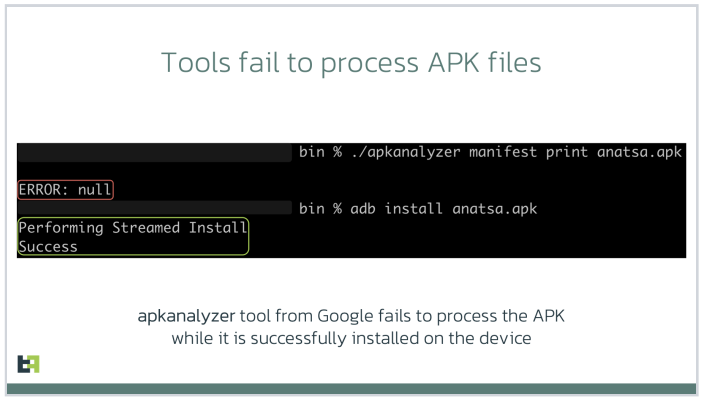
Image: ThreatFabric.
According to ThreatFabric, there are a few telltale signs that app analyzers can look for that may indicate a malicious app is abusing the weakness to masquerade as benign. For starters, they found that apps modified in this way have Android Manifest files that contain newer timestamps than the rest of the files in the software package.
More critically, the Manifest file itself will be changed so that the number of “strings” — plain text in the code, such as comments — specified as present in the app does match the actual number of strings in the software.
One of the mobile malware families known to be abusing this obfuscation method has been dubbed Anatsa, which is a sophisticated Android-based banking trojan that typically is disguised as a harmless application for managing files. Last month, ThreatFabric detailed how the crooks behind Anatsa will purchase older, abandoned file managing apps, or create their own and let the apps build up a considerable user base before updating them with malicious components.
ThreatFabric says Anatsa poses as PDF viewers and other file managing applications because these types of apps already have advanced permissions to remove or modify other files on the host device. The company estimates the people behind Anatsa have delivered more than 30,000 installations of their banking trojan via ongoing Google Play Store malware campaigns.
Google has come under fire in recent months for failing to more proactively police its Play Store for malicious apps, or for once-legitimate applications that later go rogue. This May 2023 story from Ars Technica about a formerly benign screen recording app that turned malicious after garnering 50,000 users notes that Google doesn’t comment when malware is discovered on its platform, beyond thanking the outside researchers who found it and saying the company removes malware as soon as it learns of it.
“The company has never explained what causes its own researchers and automated scanning process to miss malicious apps discovered by outsiders,” Ars’ Dan Goodin wrote. “Google has also been reluctant to actively notify Play users once it learns they were infected by apps promoted and made available by its own service.”
The Ars story mentions one potentially positive change by Google of late: A preventive measure available in Android versions 11 and higher that implements “app hibernation,” which puts apps that have been dormant into a hibernation state that removes their previously granted runtime permissions.








The Russian government today handed down a treason conviction and 14-year prison sentence on Iyla Sachkov, the former founder and CEO of one of Russia’s largest cybersecurity firms. Sachkov, 37, has been detained for nearly two years under charges that the Kremlin has kept classified and hidden from public view, and he joins a growing roster of former Russian cybercrime fighters who are now serving hard time for farcical treason convictions.

Ilya Sachkov. Image: Group-IB.com.
In 2003, Sachkov founded Group-IB, a cybersecurity and digital forensics company that quickly earned a reputation for exposing and disrupting large-scale cybercrime operations, including quite a few that were based in Russia and stealing from Russian companies and citizens.
In September 2021, the Kremlin issued treason charges against Sachkov, although it has refused to disclose any details about the allegations. Sachkov pleaded not guilty. After a three-week “trial” that was closed to the public, Sachkov was convicted of treason and sentenced to 14 years in prison. Prosecutors had asked for 18 years.
Group-IB relocated its headquarters to Singapore several years ago, although it did not fully exit the Russian market until April 2023. In a statement, Group-IB said that during their founder’s detainment, he was denied the right to communicate — no calls, no letters — with the outside world for the first few months, and was deprived of any visits from family and friends.
“Ultimately, Ilya has been denied a chance for an impartial trial,” reads a blog post on the company’s site. “All the materials of the case are kept classified, and all hearings were held in complete secrecy with no public scrutiny. As a result, we might never know the pretext for his conviction.”
Prior to his arrest in 2021, Sachkov publicly chastised the Kremlin for turning a blind eye to the epidemic of ransomware attacks coming from Russia. In a speech covered by the Financial Times in 2021, Sachkov railed against the likes of Russian hacker Maksim Yakubets, the accused head of a hacking group called Evil Corp. that U.S. officials say has stolen hundreds of millions of dollars over the past decade.
“Yakubets has been spotted driving around Moscow in a fluorescent camouflage Lamborghini, with a custom licence plate that reads ‘THIEF,'” FT’s Max Seddon wrote. “He also ‘provides direct assistance to the Russian government’s malicious cyber efforts,’ according to US Treasury sanctions against him.”
In December 2021, Bloomberg reported that Sachkov was alleged to have given the United States information about the Russian “Fancy Bear” operation that sought to influence the 2016 U.S. election. Fancy Bear is one of several names (e.g., APT28) for an advanced Russian cyber espionage group that has been linked to the Russian military intelligence agency GRU.
In 2019, a Moscow court meted out a 22-year prison sentence for alleged treason charges against Sergei Mikhailov, formerly deputy chief of Russia’s top anti-cybercrime unit. The court also levied a 14-year sentence against Ruslan Stoyanov, a senior employee at Kaspersky Lab. Both men maintained their innocence throughout the trial, and the supposed reason for the treason charges has never been disclosed.
Following their dramatic arrests in 2016, some media outlets reported that the men were suspected of having tipped off American intelligence officials about those responsible for Russian hacking activities tied to the 2016 U.S. presidential election.
That’s because two others arrested for treason at the same time — Mikhailov subordinates Georgi Fomchenkov and Dmitry Dokuchaev — were reported by Russian media to have helped the FBI investigate Russian servers linked to the 2016 hacking of the Democratic National Committee.
Researchers this month uncovered a two-year-old Linux-based remote access trojan dubbed AVrecon that enslaves Internet routers into botnet that bilks online advertisers and performs password-spraying attacks. Now new findings reveal that AVrecon is the malware engine behind a 12-year-old service called SocksEscort, which rents hacked residential and small business devices to cybercriminals looking to hide their true location online.
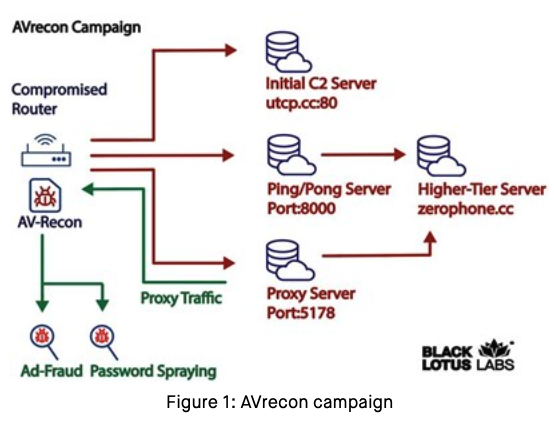
Image: Lumen’s Black Lotus Labs.
In a report released July 12, researchers at Lumen’s Black Lotus Labs called the AVrecon botnet “one of the largest botnets targeting small-office/home-office (SOHO) routers seen in recent history,” and a crime machine that has largely evaded public attention since first being spotted in mid-2021.
“The malware has been used to create residential proxy services to shroud malicious activity such as password spraying, web-traffic proxying and ad fraud,” the Lumen researchers wrote.
Malware-based anonymity networks are a major source of unwanted and malicious web traffic directed at online retailers, Internet service providers (ISPs), social networks, email providers and financial institutions. And a great many of these “proxy” networks are marketed primarily to cybercriminals seeking to anonymize their traffic by routing it through an infected PC, router or mobile device.
Proxy services can be used in a legitimate manner for several business purposes — such as price comparisons or sales intelligence — but they are massively abused for hiding cybercrime activity because they make it difficult to trace malicious traffic to its original source. Proxy services also let users appear to be getting online from nearly anywhere in the world, which is useful if you’re a cybercriminal who is trying to impersonate someone from a specific place.
Spur.us, a startup that tracks proxy services, told KrebsOnSecurity that the Internet addresses Lumen tagged as the AVrecon botnet’s “Command and Control” (C2) servers all tie back to a long-running proxy service called SocksEscort.
SocksEscort[.]com, is what’s known as a “SOCKS Proxy” service. The SOCKS (or SOCKS5) protocol allows Internet users to channel their Web traffic through a proxy server, which then passes the information on to the intended destination. From a website’s perspective, the traffic of the proxy network customer appears to originate from a rented/malware-infected PC tied to a residential ISP customer, not from the proxy service customer.

The SocksEscort home page says its services are perfect for people involved in automated online activity that often results in IP addresses getting blocked or banned, such as Craigslist and dating scams, search engine results manipulation, and online surveys.
Spur tracks SocksEscort as a malware-based proxy offering, which means the machines doing the proxying of traffic for SocksEscort customers have been infected with malicious software that turns them into a traffic relay. Usually, these users have no idea their systems are compromised.
Spur says the SocksEscort proxy service requires customers to install a Windows based application in order to access a pool of more than 10,000 hacked devices worldwide.
“We created a fingerprint to identify the call-back infrastructure for SocksEscort proxies,” Spur co-founder Riley Kilmer said. “Looking at network telemetry, we were able to confirm that we saw victims talking back to it on various ports.”
According to Kilmer, AVrecon is the malware that gives SocksEscort its proxies.
“When Lumen released their report and IOCs [indicators of compromise], we queried our system for which proxy service call-back infrastructure overlapped with their IOCs,” Kilmer continued. “The second stage C2s they identified were the same as the IPs we labeled for SocksEscort.”
Lumen’s research team said the purpose of AVrecon appears to be stealing bandwidth – without impacting end-users – in order to create a residential proxy service to help launder malicious activity and avoid attracting the same level of attention from Tor-hidden services or commercially available VPN services.
“This class of cybercrime activity threat may evade detection because it is less likely than a crypto-miner to be noticed by the owner, and it is unlikely to warrant the volume of abuse complaints that internet-wide brute-forcing and DDoS-based botnets typically draw,” Lumen’s Black Lotus researchers wrote.
Preserving bandwidth for both customers and victims was a primary concern for SocksEscort in July 2022, when 911S5 — at the time the world’s largest known malware proxy network — got hacked and imploded just days after being exposed in a story here. Kilmer said after 911’s demise, SocksEscort closed its registration for several months to prevent an influx of new users from swamping the service.
Danny Adamitis, principal information security researcher at Lumen and co-author of the report on AVrecon, confirmed Kilmer’s findings, saying the C2 data matched up with what Spur was seeing for SocksEscort dating back to September 2022.
Adamitis said that on July 13 — the day after Lumen published research on AVrecon and started blocking any traffic to the malware’s control servers — the people responsible for maintaining the botnet reacted quickly to transition infected systems over to a new command and control infrastructure.
“They were clearly reacting and trying to maintain control over components of the botnet,” Adamitis said. “Probably, they wanted to keep that revenue stream going.”
Frustratingly, Lumen was not able to determine how the SOHO devices were being infected with AVrecon. Some possible avenues of infection include exploiting weak or default administrative credentials on routers, and outdated, insecure firmware that has known, exploitable security vulnerabilities.
KrebsOnSecurity briefly visited SocksEscort last year and promised a follow-up on the history and possible identity of its proprietors. A review of the earliest posts about this service on Russian cybercrime forums suggests the 12-year-old malware proxy network is tied to a Moldovan company that also offers VPN software on the Apple Store and elsewhere.
SocksEscort began in 2009 as “super-socks[.]com,” a Russian-language service that sold access to thousands of compromised PCs that could be used to proxy traffic. Someone who picked the nicknames “SSC” and “super-socks” and email address “michvatt@gmail.com” registered on multiple cybercrime forums and began promoting the proxy service.
According to DomainTools.com, the apparently related email address “michdomain@gmail.com” was used to register SocksEscort[.]com, super-socks[.]com, and a few other proxy-related domains, including ip-score[.]com, segate[.]org seproxysoft[.]com, and vipssc[.]us. Cached versions of both super-socks[.]com and vipssc[.]us show these sites sold the same proxy service, and both displayed the letters “SSC” prominently at the top of their homepages.
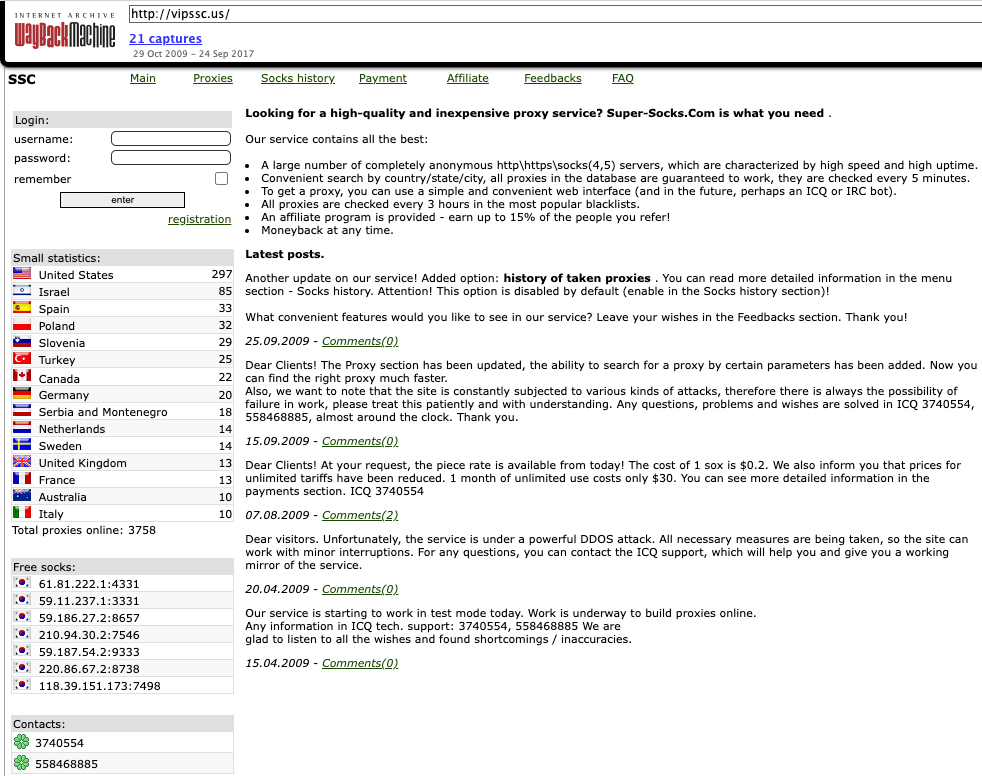
Image: Archive.org. Page translation from Russian via Google Translate.
According to cyber intelligence firm Intel 471, the very first “SSC” identity registered on the cybercrime forums happened in 2009 at the Russian language hacker community Antichat, where SSC asked fellow forum members for help in testing the security of a website they claimed was theirs: myiptest[.]com, which promised to tell visitors whether their proxy address was included on any security or anti-spam block lists.
Myiptest[.]com is no longer responding, but a cached copy of it from Archive.org shows that for about four years it included in its HTML source a Google Analytics code of US-2665744, which was also present on more than a dozen other websites.
Most of the sites that once bore that Google tracking code are no longer online, but nearly all of them centered around services that were similar to myiptest[.]com, such as abuseipdb[.]com, bestiptest[.]com, checkdnslbl[.]com, dnsbltools[.]com and dnsblmonitor[.]com.
Each of these services were designed to help visitors quickly determine whether the Internet address they were visiting the site from was listed by any security firms as spammy, malicious or phishous. In other words, these services were designed so that proxy service users could easily tell if their rented Internet address was still safe to use for online fraud.
Another domain with the Google Analytics code US-2665744 was sscompany[.]net. An archived copy of the site says SSC stands for “Server Support Company,” which advertised outsourced solutions for technical support and server administration.
Leaked copies of the hacked Antichat forum indicate the SSC identity registered on the forum using the IP address 71.229.207.214. That same IP was used to register the nickname “Deem3n®,” a prolific poster on Antichat between 2005 and 2009 who served as a moderator on the forum.
There was a Deem3n® user on the webmaster forum Searchengines.guru whose signature in their posts says they run a popular community catering to programmers in Moldova called sysadmin[.]md, and that they were a systems administrator for sscompany[.]net.
That same Google Analytics code is also now present on the homepages of wiremo[.]co and a VPN provider called HideIPVPN[.]com.
Wiremo sells software and services to help website owners better manage their customer reviews. Wiremo’s Contact Us page lists a “Server Management LLC” in Wilmington, DE as the parent company. Server Management LLC is currently listed in Apple’s App Store as the owner of a “free” VPN app called HideIPVPN.
“The best way to secure the transmissions of your mobile device is VPN,” reads HideIPVPN’s description on the Apple Store. “Now, we provide you with an even easier way to connect to our VPN servers. We will hide your IP address, encrypt all your traffic, secure all your sensitive information (passwords, mail credit card details, etc.) form [sic] hackers on public networks.”
When asked about the company’s apparent connection to SocksEscort, Wiremo responded, “We do not control this domain and no one from our team is connected to this domain.” Wiremo did not respond when presented with the findings in this report.
[This is Part III in a series on research conducted for a recent Hulu documentary on the 2015 hack of marital infidelity website AshleyMadison.com.]
In 2019, a Canadian company called Defiant Tech Inc. pleaded guilty to running LeakedSource[.]com, a service that sold access to billions of passwords and other data exposed in countless data breaches. KrebsOnSecurity has learned that the owner of Defiant Tech, a 32-year-old Ontario man named Jordan Evan Bloom, was hired in late 2014 as a developer for the marital infidelity site AshleyMadison.com. Bloom resigned from AshleyMadison citing health reasons in June 2015 — less than one month before unidentified hackers stole data on 37 million users — and launched LeakedSource three months later.

Jordan Evan Bloom, posing in front of his Lamborghini.
On Jan. 15, 2018, the Royal Canadian Mounted Police (RCMP) charged then 27-year-old Bloom, of Thornhill, Ontario, with selling stolen personal identities online through the website LeakedSource[.]com.
LeakedSource was advertised on a number of popular cybercrime forums as a service that could help hackers break into valuable or high-profile accounts. LeakedSource also tried to pass itself off as a legal, legitimate business that was marketing to security firms and professionals.
The RCMP arrested Bloom in December 2017, and said he made approximately $250,000 selling hacked data, which included information on 37 million user accounts leaked in the 2015 Ashley Madison breach.
Subsequent press releases from the RCMP about the LeakedSource investigation omitted any mention of Bloom, and referred to the defendant only as Defiant Tech. In a legal settlement that is quintessentially Canadian, the matter was resolved in 2019 after Defiant Tech agreed to plead guilty. The RCMP declined to comment for this story.
The Impact Team, the hacker group that claimed responsibility for stealing and leaking the AshleyMadison user data, also leaked several years worth of email from then-CEO Noel Biderman. A review of those messages shows that Ashley Madison hired Jordan Evan Bloom as a PHP developer in December 2014 — even though the company understood that Bloom’s success as a programmer and businessman was tied to shady and legally murky enterprises.
Bloom’s recommendation came to Biderman via Trevor Sykes, then chief technology officer for Ashley Madison parent firm Avid Life Media (ALM). The following is an email from Sykes to Biderman dated Nov. 14, 2014:
“Greetings Noel,
“We’d like to offer Jordan Bloom the position of PHP developer reporting to Mike Morris for 75k CAD/Year. He did well on the test, but he also has a great understanding of the business side of things having run small businesses himself. This was an internal referral.”
When Biderman responded that he needed more information about the candidate, Sykes replied that Bloom was independently wealthy as a result of his forays into the shadowy world of “gold farming” — the semi-automated use of large numbers of player accounts to win some advantage that is usually related to cashing out game accounts or inventory. Gold farming is particularly prevalent in massively multiplayer online role-playing games (MMORPGs), such as RuneScape and World of Warcraft.
“In his previous experience he had been doing RMT (Real Money Trading),” Sykes wrote. “This is the practice of selling virtual goods in games for real world money. This is a grey market, which is usually against the terms and services of the game companies.” Here’s the rest of his message to Biderman:
“RMT sellers traditionally have a lot of problems with chargebacks, and payment processor compliance. During my interview with him, I spent some time focusing in on this. He had to demonstrate to the processor, Paypal, at the time he had a business and technical strategy to address his charge back rate.”
“He ran this company himself, and did all the coding, including the integration with the processors,” Sykes continued in his assessment of Bloom. “Eventually he was squeezed out by Chinese gold farmers, and their ability to market with much more investment than he could. In addition the cost of ‘farming’ the virtual goods was cheaper in China to do than in North America.”
The gold farming reference is fascinating because in 2017 KrebsOnSecurity published Who Ran LeakedSource?, which examined clues suggesting that one of the administrators of LeakedSource also was the admin of abusewith[.]us, a site unabashedly dedicated to helping people hack email and online gaming accounts.
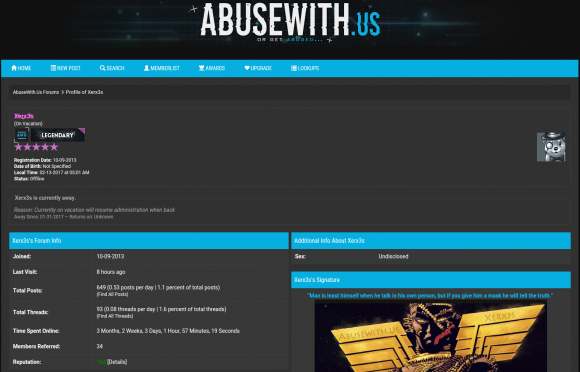
An administrator account Xerx3s on Abusewithus.
Abusewith[.]us began in September 2013 as a forum for learning and teaching how to hack accounts at Runescape, an MMORPG set in a medieval fantasy realm where players battle for kingdoms and riches.
The currency with which Runescape players buy and sell weapons, potions and other in-game items are virtual gold coins, and many of Abusewith[dot]us’s early members traded in a handful of commodities: Phishing kits and exploits that could be used to steal Runescape usernames and passwords from fellow players; virtual gold plundered from hacked accounts; and databases from hacked forums and websites related to Runescape and other online games.
That 2017 report here interviewed a Michigan man who acknowledged being administrator of Abusewith[.]us, but denied being the operator of LeakedSource. Still, the story noted that LeakedSource likely had more than one operator, and breached records show Bloom was a prolific member of Abusewith[.]us.
In an email to all employees on Dec. 1, 2014, Ashley Madison’s director of HR said Bloom graduated from York University in Toronto with a degree in theoretical physics, and that he has been an active programmer since high school.
“He’s a proprietor of a high traffic multiplayer game and developer/publisher of utilities such as PicTrace,” the HR director enthused. “He will be a great addition to the team.”
PicTrace appears to have been a service that allowed users to glean information about anyone who viewed an image hosted on the platform, such as their Internet address, browser type and version number. A copy of pictrace[.]com from Archive.org in 2012 redirects to the domain qksnap.com, which DomainTools.com says was registered to a Jordan Bloom from Thornhill, ON that same year.
The street address listed in the registration records for qksnap.com — 204 Beverley Glen Blvd — also shows up in the registration records for leakadvisor[.]com, a domain registered in 2017 just months after Canadian authorities seized the servers running LeakedSource.

Pictrace, one of Jordan Bloom’s early IT successes.
A review of passive DNS records from DomainTools indicates that in 2013 pictrace[.]com shared a server with just a handful of other domains, including Near-Reality[.]com — a popular RuneScape Private Server (RSPS) game based on the RuneScape MMORPG.
Copies of near-reality[.]com from 2013 via Archive.org show the top of the community’s homepage was retrofitted with a message saying Near Reality was no longer available due to a copyright dispute. Although the site doesn’t specify the other party to the copyright dispute, it appears Near-Reality got sued by Jagex, the owner of RuneScape.
The message goes on to say the website will no longer “encourage, facilitate, enable or condone (i) any infringement of copyright in RuneScape or any other Jagex product; nor (ii) any breach of the terms and conditions of RuneScape or any other Jagex product.”

A scene from the MMORPG RuneScape.
Near Reality also has a Facebook page that was last updated in 2019, when its owner posted a link to a news story about Defiant Tech’s guilty plea in the LeakedSource investigation. That Facebook page indicates Bloom also went by the nickname “Agentjags.”
“Just a quick PSA,” reads a post to the Near Reality Facebook page dated Jan. 21, 2018, which linked to a story about the charges against Bloom and a photo of Bloom standing in front of his lime-green Lamborghini. “Agentjags has got involved in some shady shit that may have compromised your personal details. I advise anyone who is using an old NR [Near Reality] password for anything remotely important should change it ASAP.”
By the beginning of 2016, Bloom was nowhere to be found, and was suspected of having fled his country for the Caribbean, according to the people commenting on the Near Reality Facebook page:
“Jordan aka Agentjags has gone missing,” wrote a presumed co-owner of the Facebook page. “He is supposedly hiding in St. Lucia, doing what he loved, scuba-diving. Any information to his whereabouts will be appreciated.”
KrebsOnSecurity ran the unusual nickname “AgentJags” through a search at Constella Intelligence, a commercial service that tracks breached data sets. That search returned just a few dozen results — and virtually all were accounts at various RuneScape-themed sites, including a half-dozen accounts at Abusewith[.]us.
Constella found other “AgentJags” accounts tied to the email address ownagegaming1@gmail.com. The marketing firm Apollo.io experienced a data breach several years back, and according to Apollo the email address ownagegaming1@gmail.com belongs to Jordan Bloom in Ontario.
Constella also revealed that the password frequently used by ownagegaming1@gmail.com across many sites was some variation on “niggapls,” which my 2017 report found was also the password used by the administrator of LeakedSource.
Constella discovered that the email eric.malek@rogers.com comes up when one searches for “AgentJags.” This is curious because emails leaked from Ashley Madison’s then-CEO Biderman show that Eric Malek from Toronto was the Ashley Madison employee who initially recommended Bloom for the PHP developer job.
According to DomainTools.com, Eric.Malek@rogers.com was used to register the domain devjobs.ca, which previously advertised “the most exciting developer jobs in Canada, delivered to you weekly.” Constella says eric.malek@rogers.com also had an account at Abusewith[.]us — under the nickname “Jags.”
Biderman’s email records show Eric Malek was also a PHP developer for Ashley Madison, and that he was hired into this position just a few months before Bloom — on Sept. 2, 2014. The CEO’s leaked emails show Eric Malek resigned from his developer position at Ashley Madison on June 19, 2015.
“Please note that Eric Malek has resigned from this position with Avid and his last day will be June 19th,” read a June 5, 2015 email from ALM’s HR director. “He is resigning to deal with some personal issues which include health issues. Because he is not sure how much time it will take to resolve, he is not requesting a leave of absence (his time off will be indefinite). Overall, he likes the company and plans to reach out to Trevor or I when the issues are resolved to see what is available at that time.”
A follow-up email from Biderman demanded, “want to know where he’s truly going….,” and it’s unclear whether there was friction with Malek’s departure. But ALM General Counsel Avi Weisman replied indicating that Malek probably would not sign an “Exit Acknowledgment Form” prior to leaving, and that the company had unanswered questions for Malek.
“Aneka should dig during exit interview,” Weisman wrote. “Let’s see if he balks at signing the Acknowledgment.”
Bloom’s departure notice from Ashley Madison’s HR person, dated June 23, 2015, read:
“Please note that Jordan Bloom has resigned from his position as PHP Developer with Avid. He is leaving for personal reasons. He has a neck issue that will require surgery in the upcoming months and because of his medical appointment schedule and the pain he is experiencing he can no longer commit to a full-time schedule. He may pick up contract work until he is back to 100%.”
A follow-up note to Biderman about this announcement read:
“Note that he has disclosed that he is independently wealthy so he can get by without FT work until he is on the mend. He has signed the Exit Acknowledgement Form already without issue. He also says he would consider reapplying to Avid in the future if we have opportunities available at that time.”
Perhaps Mr. Bloom hurt his neck from craning it around blind spots in his Lamborghini. Maybe it was from a bad scuba outing. Whatever the pain in Bloom’s neck was, it didn’t stop him from launching himself fully into LeakedSource[.]com, which was registered roughly one month after the Impact Team leaked data on 37 million Ashley Madison accounts.
Mr. Malek declined a request for comment. A now-deleted LinkedIn profile for Malek from December 2018 listed him as a “technical recruiter” from Toronto who also attended Mr. Bloom’s alma mater — York University. That resume did not mention Mr. Malek’s brief stint as a PHP developer at Ashley Madison.
“Developer, entrepreneur, and now technical recruiter of the most uncommon variety!” Mr. Malek’s LinkedIn profile enthused. “Are you a developer, or other technical specialist, interested in working with a recruiter who can properly understand your concerns and aspirations, technical, environmental and financial? Don’t settle for a ‘hack’; this is your career, let’s do it right! Connect with me on LinkedIn. Note: If you are not a resident of Canada/Toronto, I cannot help you.”
Mr. Bloom told KrebsOnSecurity he had no role in harming or hacking Ashley Madison. Bloom validated his identity by responding at one of the email addresses mentioned above, and agreed to field questions so long as KrebsOnSecurity agreed to publish our email conversation in full (PDF).
Bloom said Mr. Malek did recommend him for the Ashley Madison job, but that Mr. Malek also received a $5,000 referral bonus for doing so. Given Mr. Malek’s stated role as a technical recruiter, it seems likely he also recommended several other employees to Ashley Madison.
Bloom was asked whether anyone at the RCMP, Ashley Madison or any authority anywhere ever questioned him in connection with the July 2015 hack of Ashley Madison. He replied that he was called once by someone claiming to be from the Toronto Police Service asking if he knew anything about the Ashley Madison hack.
“The AM situation was not something they pursued according to the RCMP disclosure,” Bloom wrote. “Learning about the RCMP’s most advanced cyber investigative techniques and capabilities was very interesting though. I was eventually told information by a third party which included knowledge that law enforcement effectively knew who the hacker was, but didn’t have enough evidence to proceed with a case. That is the extent of my involvement with any authorities.”
As to his company’s guilty plea for operating LeakedSource, Bloom maintains that the judge at his preliminary inquiry found that even if everything the Canadian government alleged was true it would not constitute a violation of any law in Canada with respect the charges the RCMP leveled against him, which included unauthorized use of a computer and “mischief to data.”
“In Canada at the lower court level we are allowed to possess stolen information and manipulate our copies of them as we please,” Bloom said. “The judge however decided that a trial was required to determine whether any activities of mine were reckless, as the other qualifier of intentionally criminal didn’t apply. I will note here that nothing I was accused of doing would have been illegal if done in the United States of America according to their District Attorney. +1 for free speech in America vs freedom of expression in Canada.”
“Shortly after their having most of their case thrown out, the Government proposed an offer during a closed door meeting where they would drop all charges against me, provide full and complete personal immunity, and in exchange the Corporation which has since been dissolved would plead guilty,” Bloom continued. “The Corporation would also pay a modest fine.”
Bloom said he left Ashley Madison because he was bored, but he acknowledged starting LeakedSource partly in response to the Ashley Madison hack.
“I intended to leverage my gaming connections to get into security work including for other private servers such as Minecraft communities and others,” Bloom said. “After months of asking management for more interesting tasks, I became bored. Some days I had virtually nothing to do except spin in my chair so I would browse the source code for security holes to fix because I found it enjoyable.”
“I believe the decision to start LS [LeakedSource] was partly inspired by the AM hack itself, and the large number of people from a former friend group messaging me asking if XYZ person was in the leak after I revealed to them that I downloaded a copy and had the ability to browse it,” Bloom continued. “LS was never my idea – I was just a builder, and the only Canadian. In other countries it was never thought to be illegal on closer examination of their laws.”
Bloom said he still considers himself independently wealthy, and that still has the lime green Lambo. But he said he’s currently unemployed and can’t seem to land a job in what he views as his most promising career path: Information security.
“As I’m sure you’re aware, having negative media attention associated with alleged (key word) criminal activity can have a detrimental effect on employment, banking and relationships,” Bloom wrote. “I have no current interest in being a business owner, nor do I have any useful business ideas to be honest. I was and am interested in interesting Information Security/programming work but it’s too large of a risk for any business to hire someone who was formerly accused of a crime.”
If you liked this story, please consider reading the first two pieces in this series:
SEO Expert Hired and Fired by Ashley Madison Turned on Company, Promising Revenge
Top Suspect in 2015 Ashley Madison Hack Committed Suicide in 2014
Microsoft Corp. today released software updates to quash 130 security bugs in its Windows operating systems and related software, including at least five flaws that are already seeing active exploitation. Meanwhile, Apple customers have their own zero-day woes again this month: On Monday, Apple issued (and then quickly pulled) an emergency update to fix a zero-day vulnerability that is being exploited on MacOS and iOS devices.

On July 10, Apple pushed a “Rapid Security Response” update to fix a code execution flaw in the Webkit browser component built into iOS, iPadOS, and macOS Ventura. Almost as soon as the patch went out, Apple pulled the software because it was reportedly causing problems loading certain websites. MacRumors says Apple will likely re-release the patches when the glitches have been addressed.
Launched in May, Apple’s Rapid Security Response updates are designed to address time-sensitive vulnerabilities, and this is the second month Apple has used it. July marks the sixth month this year that Apple has released updates for zero-day vulnerabilities — those that get exploited by malware or malcontents before there is an official patch available.
If you rely on Apple devices and don’t have automatic updates enabled, please take a moment to check the patch status of your various iDevices. The latest security update that includes the fix for the zero-day bug should be available in iOS/iPadOS 16.5.1, macOS 13.4.1, and Safari 16.5.2.
On the Windows side, there are at least four vulnerabilities patched this month that earned high CVSS (badness) scores and that are already being exploited in active attacks, according to Microsoft. They include CVE-2023-32049, which is a hole in Windows SmartScreen that lets malware bypass security warning prompts; and CVE-2023-35311 allows attackers to bypass security features in Microsoft Outlook.
The two other zero-day threats this month for Windows are both privilege escalation flaws. CVE-2023-32046 affects a core Windows component called MSHTML, which is used by Windows and other applications, like Office, Outlook and Skype. CVE-2023-36874 is an elevation of privilege bug in the Windows Error Reporting Service.
Many security experts expected Microsoft to address a fifth zero-day flaw — CVE-2023-36884 — a remote code execution weakness in Office and Windows.
“Surprisingly, there is no patch yet for one of the five zero-day vulnerabilities,” said Adam Barnett, lead software engineer at Rapid7. “Microsoft is actively investigating publicly disclosed vulnerability, and promises to update the advisory as soon as further guidance is available.”
Barnett notes that Microsoft links exploitation of this vulnerability with Storm-0978, the software giant’s name for a cybercriminal group based out of Russia that is identified by the broader security community as RomCom.
“Exploitation of CVE-2023-36884 may lead to installation of the eponymous RomCom trojan or other malware,” Barnett said. “[Microsoft] suggests that RomCom / Storm-0978 is operating in support of Russian intelligence operations. The same threat actor has also been associated with ransomware attacks targeting a wide array of victims.”
Microsoft’s advisory on CVE-2023-36884 is pretty sparse, but it does include a Windows registry hack that should help mitigate attacks on this vulnerability. Microsoft has also published a blog post about phishing campaigns tied to Storm-0978 and to the exploitation of this flaw.
Barnett said it’s while it’s possible that a patch will be issued as part of next month’s Patch Tuesday, Microsoft Office is deployed just about everywhere, and this threat actor is making waves.
“Admins should be ready for an out-of-cycle security update for CVE-2023-36884,” he said.

Microsoft also today released new details about how it plans to address the existential threat of malware that is cryptographically signed by…wait for it….Microsoft.
In late 2022, security experts at Sophos, Trend Micro and Cisco warned that ransomware criminals were using signed, malicious drivers in an attempt to evade antivirus and endpoint detection and response (EDR) tools.
In a blog post today, Sophos’s Andrew Brandt wrote that Sophos identified 133 malicious Windows driver files that were digitally signed since April 2021, and found 100 of those were actually signed by Microsoft. Microsoft said today it is taking steps to ensure those malicious driver files can no longer run on Windows computers.
As KrebsOnSecurity noted in last month’s story on malware signing-as-a-service, code-signing certificates are supposed to help authenticate the identity of software publishers, and provide cryptographic assurance that a signed piece of software has not been altered or tampered with. Both of these qualities make stolen or ill-gotten code-signing certificates attractive to cybercriminal groups, who prize their ability to add stealth and longevity to malicious software.
Dan Goodin at Ars Technica contends that whatever Microsoft may be doing to keep maliciously signed drivers from running on Windows is being bypassed by hackers using open source software that is popular with video game cheaters.
“The software comes in the form of two software tools that are available on GitHub,” Goodin explained. “Cheaters use them to digitally sign malicious system drivers so they can modify video games in ways that give the player an unfair advantage. The drivers clear the considerable hurdle required for the cheat code to run inside the Windows kernel, the fortified layer of the operating system reserved for the most critical and sensitive functions.”
Meanwhile, researchers at Cisco’s Talos security team found multiple Chinese-speaking threat groups have repurposed the tools—one apparently called “HookSignTool” and the other “FuckCertVerifyTimeValidity.”
“Instead of using the kernel access for cheating, the threat actors use it to give their malware capabilities it wouldn’t otherwise have,” Goodin said.
For a closer look at the patches released by Microsoft today, check out the always-thorough Patch Tuesday roundup from the SANS Internet Storm Center. And it’s not a bad idea to hold off updating for a few days until Microsoft works out any kinks in the updates: AskWoody.com usually has the lowdown on any patches that may be causing problems for Windows users.
And as ever, please consider backing up your system or at least your important documents and data before applying system updates. If you encounter any problems with these updates, please drop a note about it here in the comments.


s3-ep100-js-1200




If you’ve ever owned a domain name, the chances are good that at some point you’ve received a snail mail letter which appears to be a bill for a domain or website-related services. In reality, these misleading missives try to trick people into paying for useless services they never ordered, don’t need, and probably will never receive. Here’s a look at the most recent incarnation of this scam — DomainNetworks — and some clues about who may be behind it.
The DomainNetworks mailer may reference a domain that is or was at one point registered to your name and address. Although the letter includes the words “marketing services” in the upper right corner, the rest of the missive is deceptively designed to look like a bill for services already rendered.

DomainNetworks claims that listing your domain with their promotion services will result in increased traffic to your site. This is a dubious claim for a company that appears to be a complete fabrication, as we’ll see in a moment. But happily, the proprietors of this enterprise were not so difficult to track down.
The website Domainnetworks[.]com says it is a business with a post office box in Hendersonville, N.C., and another address in Santa Fe, N.M. There are a few random, non-technology businesses tied to the phone number listed for the Hendersonville address, and the New Mexico address was used by several no-name web hosting companies.
However, there is little connected to these addresses and phone numbers that get us any closer to finding out who’s running Domainnetworks[.]com. And neither entity appears to be an active, official company in their supposed state of residence, at least according to each state’s Secretary of State database.
The Better Business Bureau listing for DomainNetworks gives it an “F” rating, and includes more than 100 reviews by people angry at receiving one of these scams via snail mail. Helpfully, the BBB says DomainNetworks previously operated under a different name: US Domain Authority LLC.
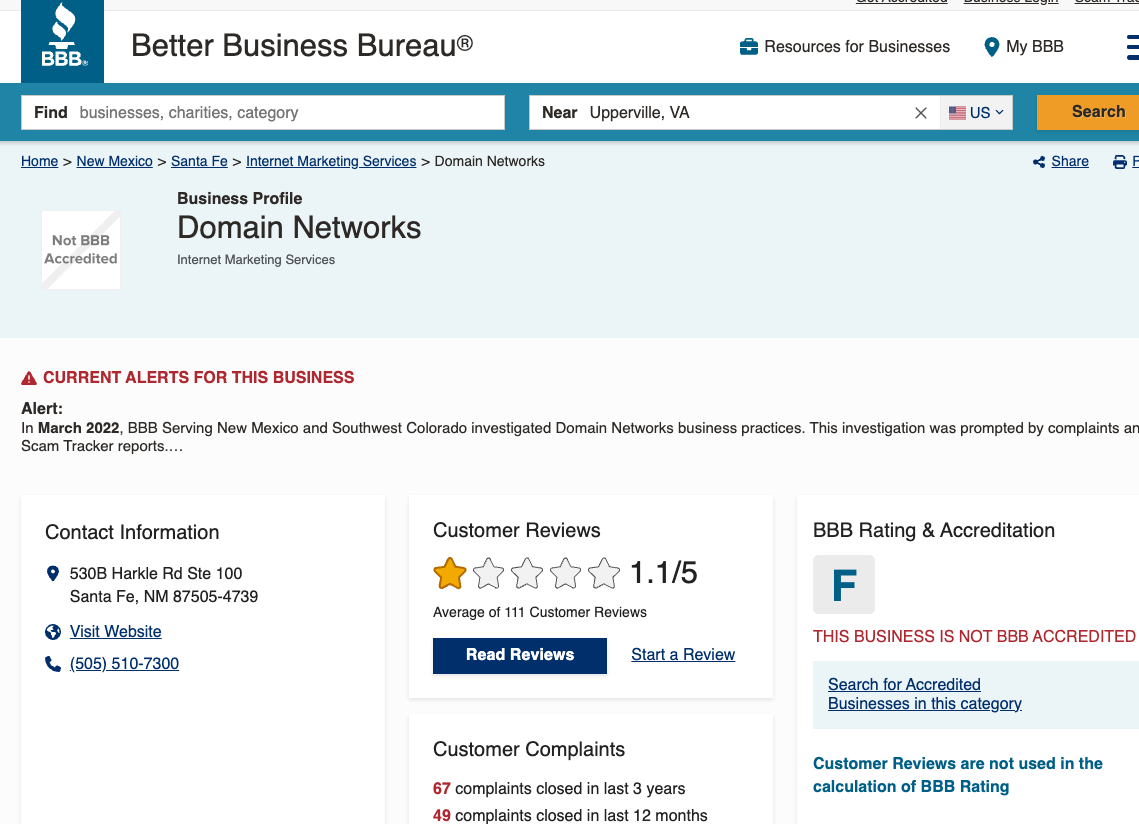
DomainNetworks has an “F” reputation with the Better Business Bureau.
Copies of snail mail scam letters from US Domain Authority posted online show that this entity used the domain usdomainauthority[.]com, registered in May 2022. The Usdomainauthority mailer also featured a Henderson, NC address, albeit at a different post office box.
Usdomainauthority[.]com is no longer online, and the site seems to have blocked its pages from being indexed by the Wayback Machine at archive.org. But searching on a long snippet of text from DomainNetworks[.]com about refund requests shows that this text was found on just one other active website, according to publicwww.com, a service that indexes the HTML code of existing websites and makes it searchable.

A deceptive snail mail solicitation from DomainNetwork’s previous iteration — US Domain Authority. Image: Joerussori.com
That other website is a domain registered in January 2023 called thedomainsvault[.]com, and its registration details are likewise hidden behind privacy services. Thedomainsvault’s “Frequently Asked Questions” page is quite similar to the one on the DomainNetworks website; both begin with the question of why the company is sending a mailer that looks like a bill for domain services.
Thedomainsvault[.]com includes no useful information about the entity or people who operate it; clicking the “Contact-us” link on the site brings up a page with placeholder Lorem Ipsum text, a contact form, and a phone number of 123456789.
However, searching passive DNS records at DomainTools.com for thedomainsvault[.]com shows that at some point whoever owns the domain instructed incoming email to be sent to ubsagency@gmail.com.
The first result that currently pops up when searching for “ubsagency” in Google is ubsagency[.]com, which says it belongs to a Las Vegas-based Search Engine Optimization (SEO) and digital marketing concern generically named both United Business Service and United Business Services. UBSagency’s website is hosted at the same Ann Arbor, Mich. based hosting firm (A2 Hosting Inc) as thedomainsvault[.]com.
UBSagency’s LinkedIn page says the company has offices in Vegas, Half Moon Bay, Calif., and Renton, Wash. But once again, none of the addresses listed for these offices reveal any obvious clues about who runs UBSagency. And once again, none of these entities appear to exist as official businesses in their claimed state of residence.
Searching on ubsagency@gmail.com in Constella Intelligence shows the address was used sometime before February 2019 to create an account under the name “Sammy\Sam_Alon” at the interior decorating site Houzz.com. In January 2019, Houzz acknowledged that a data breach exposed account information on an undisclosed number of customers, including user IDs, one-way encrypted passwords, IP addresses, city and ZIP codes, as well as Facebook information.
Sammy\Sam_Alon registered at Houzz using an Internet address in Huntsville, Ala. (68.35.149.206). Constella says this address was associated with the email tropicglobal@gmail.com, which also is tied to several other “Sammy” accounts at different stores online.
Constella also says a highly unique password re-used by tropicglobal@gmail.com across numerous sites was used in connection with just a few other email accounts, including shenhavgroup@gmail.com, and distributorinvoice@mail.com.
The shenhavgroup@gmail.com address was used to register a Twitter account for a Sam Orit Alon in 2013, whose account says they are affiliated with the Shenhav Group. According to DomainTools, shenhavgroup@gmail.com was responsible for registering roughly two dozen domains, including the now-defunct unitedbusinessservice[.]com.
Constella further finds that the address distributorinvoice@mail.com was used to register an account at whmcs.com, a web hosting platform that suffered a breach of its user database several years back. The name on the WHMCS account was Shmuel Orit Alon, from Kidron, Israel.
UBSagency also has a Facebook page, or maybe “had” is the operative word because someone appears to have defaced it. Loading the Facebook page for UBSagency shows several of the images have been overlaid or replaced with a message from someone who is really disappointed with Sam Alon.
“Sam Alon is a LIAR, THIEF, COWARD AND HAS A VERY SMALL D*CK,” reads one of the messages:

The current Facebook profile page for UBSagency includes a logo that is similar to the DomainNetworks logo.
The logo in the UBSagency profile photo includes a graphic of what appears to be a magnifying glass with a line that zig-zags through bullet points inside and outside the circle, a unique pattern that is remarkably similar to the logo for DomainNetworks:

The logos for DomainNetworks (left) and UBSagency.
Constella also found that the same Huntsville IP address used by Sam Alon at Houzz was associated with yet another Houzz account, this one for someone named “Eliran.”
The UBSagency Facebook page features several messages from an Eliran “Dani” Benz, who is referred to by commenters as an employee or partner with UBSagency. The last check-in on Benz’s profile is from a beach at Rishon Letziyon in Israel earlier this year.
Neither Mr. Alon nor Mr. Benz responded to multiple requests for comment.
It may be difficult to believe that anyone would pay an invoice for a domain name or SEO service they never ordered. However, there is plenty of evidence that these phony bills often get processed by administrative personnel at organizations that end up paying the requested amount because they assume it was owed for some services already provided.
In 2018, KrebsOnSecurity published How Internet Savvy are Your Leaders?, which examined public records to show that dozens of cities, towns, school districts and even political campaigns across the United States got snookered into paying these scam domain invoices from a similar scam company called WebListings Inc.
In 2020, KrebsOnSecurity featured a deep dive into who was likely behind the WebListings scam, which had been sending out these snail mail scam letters for over a decade. That investigation revealed the scam’s connection to a multi-level marketing operation run out of the U.K., and to two brothers living in Scotland.
Nikita Kislitsin, formerly the head of network security for one of Russia’s top cybersecurity firms, was arrested last week in Kazakhstan in response to 10-year-old hacking charges from the U.S. Department of Justice. Experts say Kislitsin’s prosecution could soon put the Kazakhstan government in a sticky diplomatic position, as the Kremlin is already signaling that it intends to block his extradition to the United States.

Nikita Kislitsin, at a security conference in Russia.
Kislitsin is accused of hacking into the now-defunct social networking site Formspring in 2012, and conspiring with another Russian man convicted of stealing tens of millions of usernames and passwords from LinkedIn and Dropbox that same year.
In March 2020, the DOJ unsealed two criminal hacking indictments against Kislitsin, who was then head of security at Group-IB, a cybersecurity company that was founded in Russia in 2003 and operated there for more than a decade before relocating to Singapore.
Prosecutors in Northern California indicted Kislitsin in 2014 for his alleged role in stealing account data from Formspring. Kislitsin also was indicted in Nevada in 2013, but the Nevada indictment does not name his alleged victim(s) in that case.
However, documents unsealed in the California case indicate Kislitsin allegedly conspired with Yevgeniy Nikulin, a Russian man convicted in 2020 of stealing 117 million usernames and passwords from Dropbox, Formspring and LinkedIn in 2012. Nikulin is currently serving a seven-year sentence in the U.S. prison system.
As first reported by Cyberscoop in 2020, a trial brief in the California investigation identified Nikulin, Kislitsin and two alleged cybercriminals — Oleg Tolstikh and Oleksandr Vitalyevich Ieremenko — as being present during a 2012 meeting at a Moscow hotel, where participants allegedly discussed starting an internet café business.
A 2010 indictment out of New Jersey accuses Ieremenko and six others with siphoning nonpublic information from the U.S. Securities & Exchange Commission (SEC) and public relations firms, and making $30 million in illegal stock trades based on the proprietary information they stole.
[The U.S. Secret Service has an outstanding $1 million reward for information leading to the arrest of Ieremenko (Александр Витальевич Еременко), who allegedly went by the hacker handles “Zl0m” and “Lamarez.”]
Kislitsin was hired by Group-IB in January 2013, nearly six months after the Formspring hack. Group-IB has since moved its headquarters to Singapore, and in April 2023 the company announced it had fully exited the Russian market.
In a statement provided to KrebsOnSecurity, Group-IB said Mr. Kislitsin is no longer an employee, and that he now works for a Russian organization called FACCT, which stands for “Fight Against Cybercrime Technologies.”
“Dmitry Volkov, co-founder and CEO, sold his stake in Group-IB’s Russia-based business to the company’s local management,” the statement reads. “The stand-alone business in Russia has been operating under the new brand FACCT ever since and will continue to operate as a separate company with no connection to Group-IB.”
FACCT says on its website that it is a “Russian developer of technologies for combating cybercrime,” and that it works with clients to fight targeted attacks, data leaks, fraud, phishing and brand abuse. In a statement published online, FACCT said Kislitsin is responsible for developing its network security business, and that he remains under temporary detention in Kazakhstan “to study the basis for extradition arrest at the request of the United States.”
“According to the information we have, the claims against Kislitsin are not related to his work at FACCT, but are related to a case more than 10 years ago when Nikita worked as a journalist and independent researcher,” FACCT wrote.
From 2006 to 2012, Kislitsin was editor-in-chief of “Hacker,” a popular Russian-language monthly magazine that includes articles on information and network security, programming, and frequently features interviews with and articles penned by notable or wanted Russian hackers.
“We are convinced that there are no legal grounds for detention on the territory of Kazakhstan,” the FACCT statement continued. “The company has hired lawyers who have been providing Nikita with all the necessary assistance since last week, and we have also sent an appeal to the Consulate General of the Russian Federation in Kazakhstan to assist in protecting our employee.”
FACCT indicated that the Kremlin has already intervened in the case, and the Russian government claims Kislitsin is wanted on criminal charges in Russia and must instead be repatriated to his homeland.
“The FACCT emphasizes that the announcement of Nikita Kislitsin on the wanted list in the territory of the Russian Federation became known only today, June 28, 6 days after the arrest in Kazakhstan,” FACCT wrote. “The company is monitoring developments.”
The Kremlin followed a similar playbook in the case of Aleksei Burkov, a cybercriminal who long operated two of Russia’s most exclusive underground hacking forums. Burkov was arrested in 2015 by Israeli authorities, and the Russian government fought Burkov’s extradition to the U.S. for four years — even arresting and jailing an Israeli woman on phony drug charges to force a prisoner swap.
That effort ultimately failed: Burkov was sent to America, pleaded guilty, and was sentenced to nine years in prison.

Alexei Burkov, seated second from right, attends a hearing in Jerusalem in 2015. Image: Andrei Shirokov / Tass via Getty Images.
Arkady Bukh is a U.S. attorney who has represented dozens of accused hackers from Russia and Eastern Europe who were extradited to the United States over the years. Bukh said Moscow is likely to turn the Kislitsin case into a diplomatic time bomb for Kazakhstan, which shares an enormous border and a great deal of cultural ties with Russia. A 2009 census found that Russians make up about 24 percent of the population of Kazakhstan.
“That would put Kazakhstan at a crossroads to choose between unity with Russia or going with the West,” Bukh said. “If that happens, Kazakhstan may have to make some very unpleasant decisions.”
Group-IB’s exodus from Russia comes as its former founder and CEO Ilya Sachkov remains languishing in a Russian prison, awaiting a farcical trial and an inevitable conviction on charges of treason. In September 2021, the Kremlin issued treason charges against Sachkov, although it has so far refused to disclose any details about the allegations.
Sachkov’s pending treason trial has been the subject of much speculation among denizens of Russian cybercrime forums, and the consensus seems to be that Sachkov and Group-IB were seen as a little too helpful to the DOJ in its various investigations involving top Russian hackers.
Indeed, since its inception in 2003, Group-IB’s researchers have helped to identify, disrupt and even catch a number of high-profile Russian hackers, most of whom got busted after years of criminal hacking because they made the unforgivable mistake of stealing from their own citizens.
When the indictments against Kislitsin were unsealed in 2020, Group-IB issued a lengthy statement attesting to his character and saying they would help him with his legal defense. As part of that statement, Group-IB noted that “representatives of the Group-IB company and, in particular, Kislitsin, in 2013, on their own initiative, met with employees of the US Department of Justice to inform them about the research work related to the underground, which was carried out by Kislitsin in 2012.”
Joseph James “PlugwalkJoe” O’Connor, a 24-year-old from the United Kingdom who earned his 15 minutes of fame by participating in the July 2020 hack of Twitter, has been sentenced to five years in a U.S. prison. That may seem like harsh punishment for a brief and very public cyber joy ride. But O’Connor also pleaded guilty in a separate investigation involving a years-long spree of cyberstalking and cryptocurrency theft enabled by “SIM swapping,” a crime wherein fraudsters trick a mobile provider into diverting a customer’s phone calls and text messages to a device they control.

Joseph “PlugwalkJoe” O’Connor, in a photo from a Globe Newswire press release Sept. 02, 2020, pitching O’Connor as a cryptocurrency expert and advisor.
On July 16, 2020 — the day after some of Twitter’s most recognizable and popular users had their accounts hacked and used to tweet out a bitcoin scam — KrebsOnSecurity observed that several social media accounts tied to O’Connor appeared to have inside knowledge of the intrusion. That story also noted that thanks to COVID-19 lockdowns at the time, O’Connor was stuck on an indefinite vacation at a popular resort in Spain.
Not long after the Twitter hack, O’Connor was quoted in The New York Times denying any involvement. “I don’t care,” O’Connor told The Times. “They can come arrest me. I would laugh at them. I haven’t done anything.”
Speaking with KrebsOnSecurity via Instagram instant message just days after the Twitter hack, PlugwalkJoe demanded that his real name be kept out of future blog posts here. After he was told that couldn’t be promised, he remarked that some people in his circle of friends had been known to hire others to deliver physical beatings on people they didn’t like.
O’Connor was still in Spain a year later when prosecutors in the Northern District of California charged him with conspiring to hack Twitter. At the same time, prosecutors in the Southern District of New York charged O’Connor with an impressive array of cyber offenses involving the exploitation of social media accounts, online extortion, cyberstalking, and the theft of cryptocurrency then valued at nearly USD $800,000.
In late April 2023, O’Connor was extradited from Spain to face charges in the United States. Two weeks later, he entered guilty pleas in both California and New York, admitting to all ten criminal charges levied against him. On June 23, O’Connor was sentenced to five years in prison.
PlugwalkJoe was part of a community that specialized in SIM-swapping victims to take over their online identities. Unauthorized SIM swapping is a scheme in which fraudsters trick or bribe employees at wireless phone companies into redirecting the target’s text messages and phone calls to a device they control.
From there, the attackers can reset the password for any of the victim’s online accounts that allow password resets via SMS. SIM swapping also lets attackers intercept one-time passwords needed for SMS-based multi-factor authentication (MFA).
O’Connor admitted to conducting SIM swapping attacks to take control over financial accounts tied to several cryptocurrency executives in May 2019, and to stealing digital currency currently valued at more than $1.6 million.
PlugwalkJoe also copped to SIM-swapping his way into the Snapchat accounts of several female celebrities and threatening to release nude photos found on their phones.
Victims who refused to give up social media accounts or submit to extortion demands were often visited with “swatting attacks,” wherein O’Connor and others would falsely report a shooting or hostage situation in the hopes of tricking police into visiting potentially lethal force on a target’s address.
Prosecutors said O’Connor even swatted and cyberstalked a 16-year-old girl, sending her nude photos and threatening to rape and/or murder her and her family.
In the case of the Twitter hack, O’Connor pleaded guilty to conspiracy to commit computer intrusions, conspiracy to commit wire fraud, and conspiracy to commit money laundering.

The account “@shinji,” a.k.a. “PlugWalkJoe,” tweeting a screenshot of Twitter’s internal tools interface, on July 15, 2020.
To resolve the case against him in New York, O’Connor pleaded guilty to conspiracy to commit computer intrusion, two counts of committing computer intrusions, making extortive communications, two counts of stalking, and making threatening communications.
In addition to the prison term, O’Connor was sentenced to three years of supervised release, and ordered to pay $794,012.64 in forfeiture.
To be clear, the Twitter hack of July 2020 did not involve SIM-swapping. Rather, Twitter said the intruders tricked a Twitter employee over the phone into providing access to internal tools.
Three others were charged along with O’Connor in the Twitter compromise. The alleged mastermind of the hack, then 17-year-old Graham Ivan Clarke from Tampa, Fla., pleaded guilty in 2021 and agreed to serve three years in prison, followed by three years probation.
This story is good reminder about the need to minimize your reliance on the mobile phone companies for securing your online identity. This means reducing the number of ways your life could be turned upside down if someone were to hijack your mobile phone number.
Most online services require users to validate a mobile phone number as part of setting up an account, but some services will let you remove your phone number after the fact. Those services that do you let you remove your phone number or disable SMS/phone calls for account recovery probably also offer more secure multi-factor authentication options, such as app-based one-time passwords and security keys. Check out 2fa.directory for a list of multi-factor options available across hundreds of popular sites and services.

Verisign today announced the launch of DNIB.com, the new Domain Name Industry Brief (DNIB) website.
Sponsored by Verisign, DNIB.com is a source for insights and analysis from subject-matter experts on key topics relevant to the global Domain Name System (DNS). DNIB.com will offer insight on policy, governance, technology, security, and business trends relevant to analysts, entrepreneurs, policymakers, and anyone with an interest in the DNS. The website features a collection of new, searchable, and interactive dashboards tracking relevant DNS data and trends, that is designed to be a valuable day-to-day resource for industry stakeholders, and anyone interested in learning more about global domain name operations.
DNIB.com is also the new home of the DNIB quarterly report, which Verisign has published for more than a decade, providing a trusted and valued resource for stakeholders across the globe seeking to understand the dynamism and trends of the domain name industry.
The report will be published each quarter at DNIB.com, summarizing the state of the domain name industry through a variety of statistical and analytical research. The new and expanded DNIB.com dashboards take that statistical data to the next level, enabling exploration of trend data across the industry, providing additional history and depth, and offering expert insights and commentary.
The post Announcing the Launch of DNIB.com, a New Source for DNS News, Information, Research, and Analysis appeared first on Verisign Blog.




If you operate a cybercrime business that relies on disseminating malicious software, you probably also spend a good deal of time trying to disguise or “crypt” your malware so that it appears benign to antivirus and security products. In fact, the process of “crypting” malware is sufficiently complex and time-consuming that most serious cybercrooks will outsource this critical function to a handful of trusted third parties. This story explores the history and identity behind Cryptor[.]biz, a long-running crypting service that is trusted by some of the biggest names in cybercrime.
Virtually all malware that is deployed for use in data stealing at some point needs to be crypted. This highly technical, laborious process involves iteratively altering the appearance and behavior of a malicious file until it no longer sets off alarm bells when scanned by different antivirus tools.
Experienced malware purveyors understand that if they’re not continuously crypting their malware before sending it out, then a lot more of whatever digital disease they are trying to spread is going to get flagged by security tools. In short, if you are running a cybercrime enterprise and you’re not equipped to handle this crypting process yourself, you probably need to pay someone else to do it for you.
Thanks to the high demand for reliable crypting services, there are countless cybercriminals who’ve hung out their shingles as crypting service providers. However, most of these people do not appear to be very good at what they do, because most are soon out of business.
One standout is Cryptor[.]biz. This service is actually recommended by the purveyors of the RedLine information stealer malware, which is a popular and powerful malware kit that specializes in stealing victim data and is often used to lay the groundwork for ransomware attacks. Cryptor[.]biz also has been recommended to customers of the Vidar information stealer malware family (via the malware’s Telegram support channels).
As good as Cryptor[.]biz may be at obfuscating malware, its proprietor does not appear to have done a great job covering his own tracks. The registration records for the website Cryptor[.]biz are hidden behind privacy protection services, but the site’s homepage says potential customers should register by visiting the domain crypt[.]guru, or by sending a Jabber instant message to the address “masscrypt@exploit.im.”
Crypt[.]guru’s registration records also are hidden, yet passive domain name system (DNS) records for both cryptor[.]biz and crypt[.]guru show that in 2018 the domains were forwarding incoming email to the address obelisk57@gmail.com.
Cyber intelligence firm Intel 471 reports that obelisk57@gmail.com was used to register an account on the forum Blacksoftware under the nickname “Kerens.” Meanwhile, the Jabber address masscrypt@exploit.im has been associated with the user Kerens on the Russian hacking forum Exploit from 2011 to the present day.
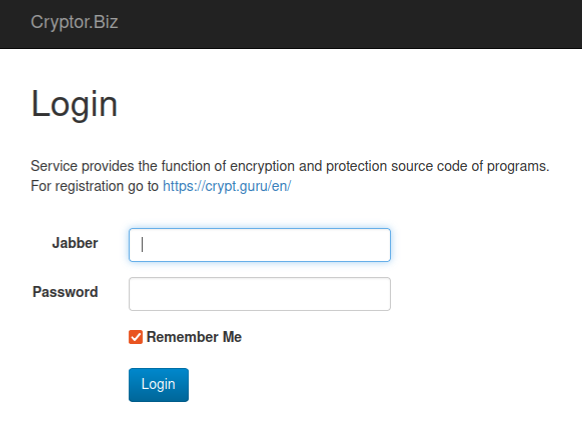
The login page for Cryptor dot biz contains several clues about who runs the service.
The very first post by Kerens on Exploit in 2011 was a negative review of a popular crypting service that predated Cryptor[.]biz called VIP Crypt, which Kerens accused of being “shitty” and unreliable. But Intel 471 finds that after his critical review of VIP Crypt, Kerens did not post publicly on Exploit again for another four years until October 2016, when they suddenly began advertising Cryptor[.]biz.
Intel 471 found that Kerens used the email address pepyak@gmail.com, which also was used to register Kerens accounts on the Russian language hacking forums Verified and Damagelab.
Ironically, Verified has itself been hacked multiple times over the years, with its private messages and user registration details leaked online. Those records indicate the user Kerens registered on Verified in March 2009 from an Internet address in Novosibirsk, a city in the southern Siberian region of Russia.
In 2010, someone with the username Pepyak on the Russian language affiliate forum GoFuckBiz[.]com shared that they typically split their time during the year between living in Siberia (during the milder months) and Thailand (when Novosibirsk is typically -15 °C/°5F).
For example, in one conversation about the best car to buy for navigating shoddy roads, Pepyak declared, “We have shitty roads in Siberia.” In January 2010, Pepyak asked the GoFuckBiz community where one might find a good USB-based modem in Phuket, Thailand.
DomainTools.com says the email address pepyak@gmail.com was used to register 28 domain names over the years, including a now-defunct Russian automobile sales website called “autodoska[.]biz.” DomainTools shows this website was registered in 2008 to a Yuri Churnov from Sevastpol, Crimea (prior to Russia’s annexation of Crimea in 2014, the peninsula was part of Ukraine).
The WHOIS records for autodoska[.]biz were changed in 2010 to Sergey Purtov (pepyak@gmail.com) from Yurga, a town in Russia’s Kemerovo Oblast, which is a relatively populous area in Western Siberia that is adjacent to Novosibirsk.

A satellite view of the region including Novosibirsk, Yurga and Kemerovo Oblast. Image: Google Maps.
Many of the 28 domains registered to pepyak@gmail.com have another email address in their registration records: unforgiven57@mail.ru. According to DomainTools, the Unforgiven email address was used to register roughly a dozen domains, including three that were originally registered to Keren’s email address — pepyak@gmail.com (e.g., antivirusxp09[.]com).
One of the domains registered in 2006 to the address unforgiven57@mail.ru was thelib[.]ru, which for many years was a place to download pirated e-books. DomainTools says thelib[.]ru was originally registered to a Sergey U Purtov.
Most of the two-dozen domains registered to pepyak@gmail.com shared a server at one point with a small number of other domains, including mobile-soft[.]su, which was registered to the email address spurtov@gmail.com.
CDEK, an express delivery company based in Novosibirsk, was apparently hacked at some point because cyber intelligence firm Constella Intelligence found that its database shows the email address spurtov@gmail.com was assigned to a Sergey Yurievich Purtov (Сергей Юрьевич Пуртов).
DomainTools says the same phone number in the registration records for autodoska[.]biz (+7.9235059268) was used to secure two other domains — bile[.]ru and thelibrary[.]ru, both of which were registered to a Sergey Y Purtov.
 A search on the phone number 79235059268 in Skype reveals these digits belong to a “Sergey” from Novosibirsk with the now-familiar username — Pepyak.
A search on the phone number 79235059268 in Skype reveals these digits belong to a “Sergey” from Novosibirsk with the now-familiar username — Pepyak.
Bringing things full circle, Constella Intelligence shows that various online accounts tied to the email address unforgiven57@mail.ru frequently relied on the somewhat unique password, “plk139t51z.” Constella says that same password was used for just a handful of other email addresses, including gumboldt@gmail.com.
Hacked customer records from CDEK show gumboldt@gmail.com was tied to a customer named Sergey Yurievich Purtov. DomainTools found that virtually all of the 15 domain names registered to gumboldt@gmail.com (including the aforementioned mobile-soft[.]su) were at one point registered to spurtov@gmail.com.
Intel 471 reports that gumboldt@gmail.com was used in 2009 to register a user by the nickname “Kolumb” on the Russian hacking forum Antichat. From Kolumb’s posts on Antichat, it seems this user was mostly interested in buying access to compromised computers inside of Russia.
Then in December 2009, Kolumb said they were in desperate need of a reliable crypting service or full-time cryptor.
“We need a person who will crypt software every day, sometimes even a couple of times a day,” Kolumb wrote on Antichat.
Mr. Purtov did not respond to requests for comment sent to any of the email addresses referenced in this report. Mail.ru responded that the email address spurtov@mail.ru is no longer active.
As KrebsOnSecurity opined on Mastodon earlier this week, it makes a lot of sense for cybersecurity researchers and law enforcement alike to focus attention on the top players in the crypting space — for several reasons. Most critically, the cybercriminals offering time-tested crypting services also tend to be among the most experienced and connected malicious coders on the planet.
Think of it this way: By definition, a crypting service scans and examines all types of malware before those new nasties are first set loose in the wild. This fact alone should make these criminal enterprises a primary target of cybersecurity firms looking to gain more timely intelligence about new malware.
Also, a review of countless posts and private messages from Pepyak and other crypting providers shows that a successful crypting service will have direct and frequent contact with some of the world’s most advanced malware authors.
In short, infiltrating or disrupting a trusted crypting service can be an excellent way to slow down or even sideline a large number of cybercrime operations all at once.
Further reading on the crypting industry:
This Service Helps Malware Authors Fix Flaws in Their Code
Antivirus is Dead: Long Live Antivirus!




The U.S. government agency in charge of improving the nation’s cybersecurity posture is ordering all federal agencies to take new measures to restrict access to Internet-exposed networking equipment. The directive comes amid a surge in attacks targeting previously unknown vulnerabilities in widely used security and networking appliances.

Under a new order from the Cybersecurity and Infrastructure Security Agency (CISA), federal agencies will have 14 days to respond to any reports from CISA about misconfigured or Internet-exposed networking equipment. The directive applies to any networking devices — such as firewalls, routers and load balancers — that allow remote authentication or administration.
The order requires federal departments to limit access so that only authorized users on an agency’s local or internal network can reach the management interfaces of these devices. CISA’s mandate follows a slew of recent incidents wherein attackers exploited zero-day flaws in popular networking products to conduct ransomware and cyber espionage attacks on victim organizations.
Earlier today, incident response firm Mandiant revealed that since at least October 2022, Chinese cyber spies have been exploiting a zero-day vulnerability in many email security gateway (ESG) appliances sold by California-based Barracuda Networks to hoover up email from organizations using these devices.
Barracuda was alerted to the exploitation of a zero-day in its products in mid-May, and two days later the company pushed a security update to address the flaw in all affected devices. But last week, Barracuda took the highly unusual step of offering to replace compromised ESGs, evidently in response to malware that altered the systems in such a fundamental way that they could no longer be secured remotely with software updates.
According to Mandiant, a previously unidentified Chinese hacking group was responsible for exploiting the Barracuda flaw, and appeared to be searching through victim organization email records for accounts “belonging to individuals working for a government with political or strategic interest to [China] while this victim government was participating in high-level, diplomatic meetings with other countries.”
When security experts began raising the alarm about a possible zero-day in Barracuda’s products, the Chinese hacking group altered their tactics, techniques and procedures (TTPs) in response to Barracuda’s efforts to contain and remediate the incident, Mandiant found.
Mandiant said the attackers will continue to change their tactics and malware, “especially as network defenders continue to take action against this adversary and their activity is further exposed by the infosec community.”
Meanwhile, this week we learned more details about the ongoing exploitation of a zero-day flaw in a broad range of virtual private networking (VPN) products made by Fortinet — devices many organizations rely on to facilitate remote network access for employees.
On June 11, Fortinet released a half-dozen security updates for its FortiOS firmware, including a weakness that researchers said allows an attacker to run malware on virtually any Fortinet SSL VPN appliance. The researchers found that just being able to reach the management interface for a vulnerable Fortinet SSL VPN appliance was enough to completely compromise the devices.
“This is reachable pre-authentication, on every SSL VPN appliance,” French vulnerability researcher Charles Fol tweeted. “Patch your #Fortigate.”
In details published on June 12, Fortinet confirmed that one of the vulnerabilities (CVE-2023-27997) is being actively exploited. The company said it discovered the weakness in an internal code audit that began in January 2023 — when it learned that Chinese hackers were exploiting a different zero-day flaw in its products.
Shodan.io, the search engine made for finding Internet of Things devices, reports that there are currently more than a half-million vulnerable Fortinet devices reachable via the public Internet.
The new cybersecurity directive from CISA orders agencies to remove any networking device management interfaces from the internet by making them only accessible from an internal enterprise network (CISA recommends an isolated management network). CISA also says agencies should “deploy capabilities, as part of a Zero Trust Architecture, that enforce access control to the interface through a policy enforcement point separate from the interface itself (preferred action).”
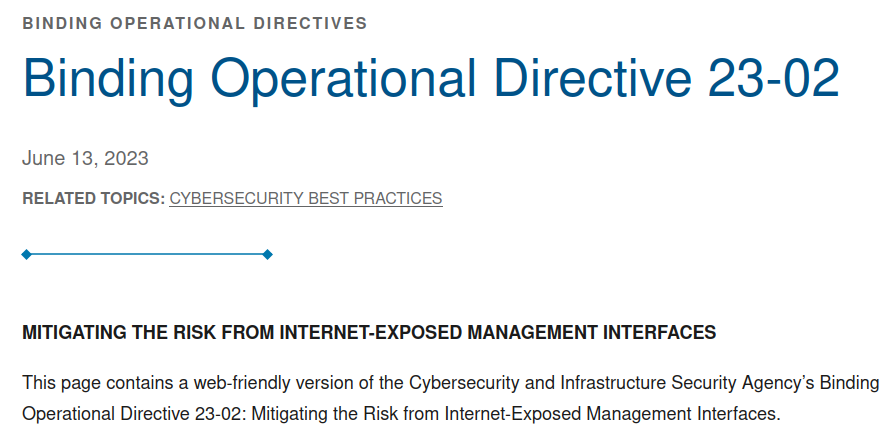
Security experts say CISA’s directive highlights the reality that cyberspies and ransomware gangs are making it increasingly risky for organizations to expose any devices to the public Internet, because these groups have strong incentives to probe such devices for previously unknown security vulnerabilities.
The most glaring example of this dynamic can be seen in the frequency with which ransomware groups have discovered and pounced on zero-day flaws in widely-used file transfer applications. One ransomware gang in particular — Cl0p — has repeatedly exploited zero day bugs in various file transfer appliances to extort tens of millions of dollars from hundreds of ransomware victims.
On February 2, KrebsOnSecurity broke the news that attackers were exploiting a zero-day vulnerability in the GoAnywhere file transfer appliance by Fortra. By the time security updates were available to fix the vulnerability, Cl0p had already used it to steal data from more than a hundred organizations running Fortra’s appliance.
According to CISA, on May 27, Cl0p began exploiting a previously unknown flaw in MOVEit Transfer, a popular Internet-facing file transfer application. MOVEit parent Progress Software has since released security updates to address the weakness, but Cl0p claims to have already used it to compromise hundreds of victim organizations. TechCrunch has been tracking the fallout from victim organizations, which range from banks and insurance providers to universities and healthcare entities.
The always on-point weekly security news podcast Risky Business has recently been urging organizations to jettison any and all FTP appliances, noting that Cl0p (or another crime gang) is likely to visit the same treatment on other FTP appliance vendors.
But that sound advice doesn’t exactly scale for mid-tier networking devices like Barracuda ESGs or Fortinet SSL VPNs, which are particularly prominent in small to mid-sized organizations.
“It’s not like FTP services, you can’t tell an enterprise [to] turn off the VPN [because] the productivity hit of disconnecting the VPN is terminal, it’s a non-starter,” Risky Business co-host Adam Boileau said on this week’s show. “So how to mitigate the impact of having to use a domain-joined network appliance at the edge of your network that is going to get zero-day in it? There’s no good answer.”
Risky Business founder Patrick Gray said the COVID-19 pandemic breathed new life into entire classes of networking appliances that rely on code which was never designed with today’s threat models in mind.
“In the years leading up to the pandemic, the push towards identity-aware proxies and zero trust everything and moving away from this type of equipment was gradual, but it was happening,” Gray said. “And then COVID-19 hit and everybody had to go work from home, and there really was one option to get going quickly — which was to deploy VPN concentrators with enterprise features.”
Gray said the security industry had been focused on building the next generation of remote access tools that are more security-hardened, but when the pandemic hit organizations scrambled to cobble together whatever they could.
“The only stuff available in the market was all this old crap that is not QA’d properly, and every time you shake them CVEs fall out,” Gray remarked, calling the pandemic, “a shot in the arm” to companies like Fortinet and Barracuda.
“They sold so many VPNs through the pandemic and this is the hangover,” Gray said. “COVID-19 extended the life of these companies and technologies, and that’s unfortunate.”